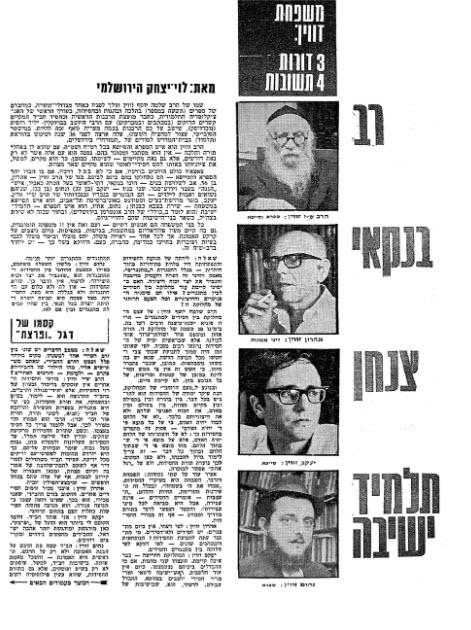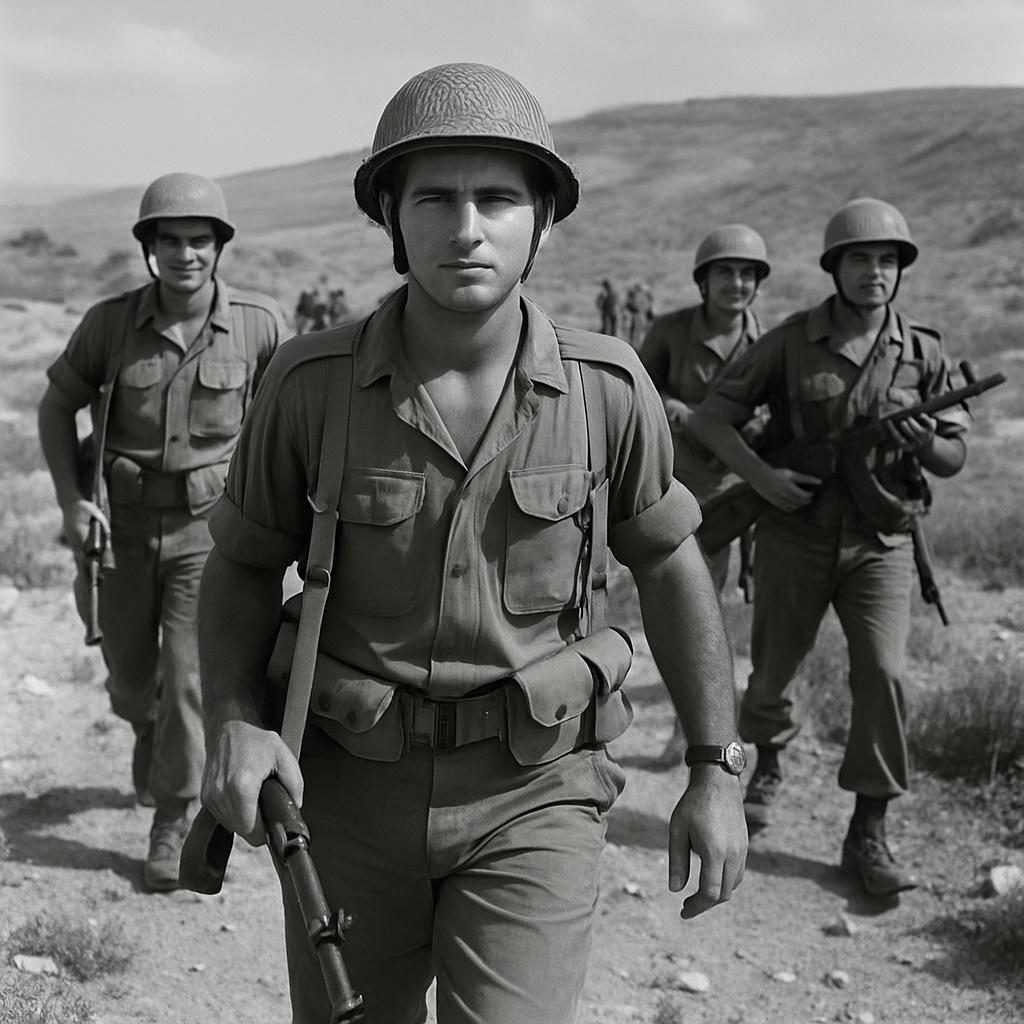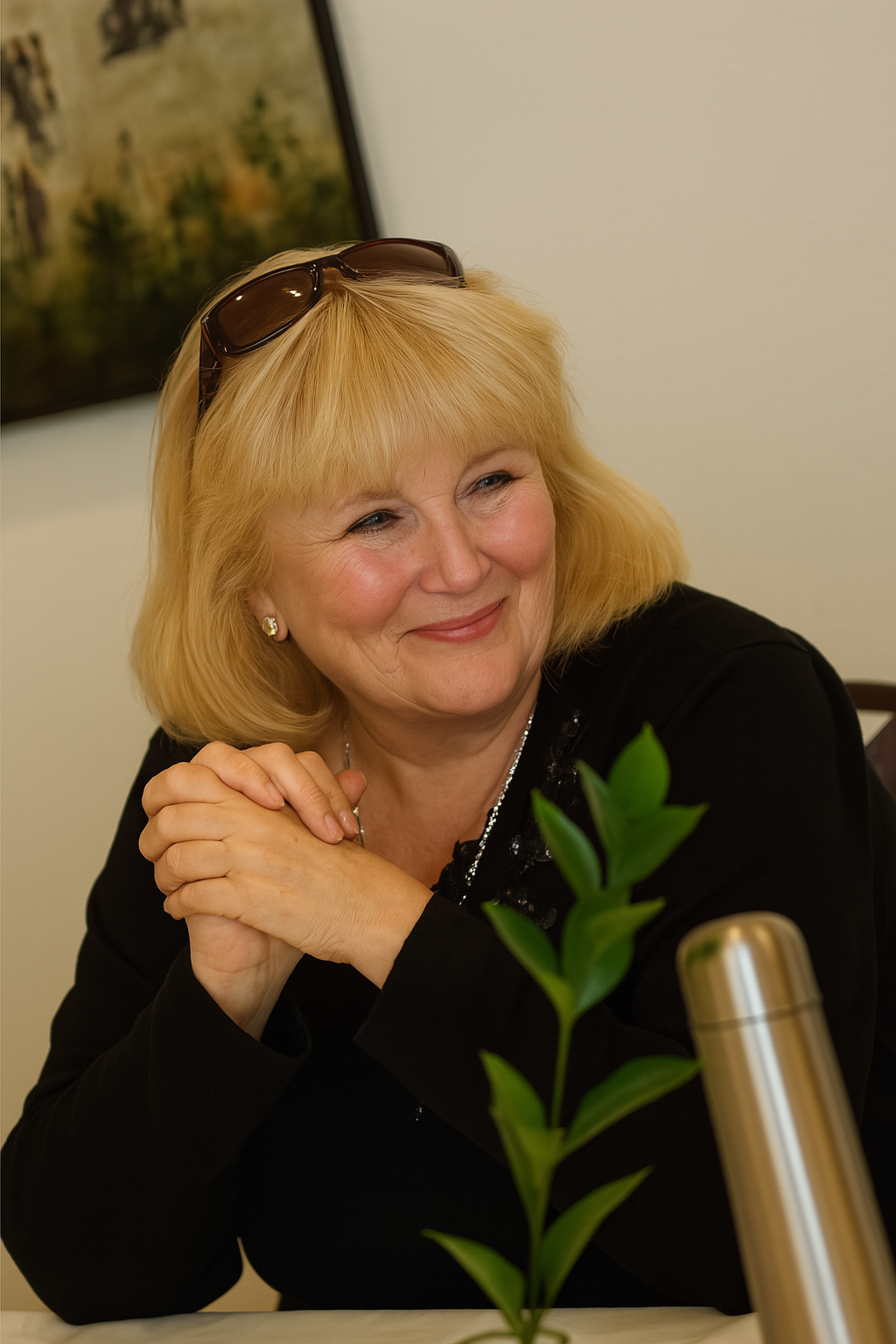An Original 1960s Feature by Maariv’s Legendary Journalist, Levi Yitzhak Yerushalmi

Historical Context: Israel in the 1960s — Judaism at a Crossroads

Israeli Village in the 1960s – Simplicity, Spirit, and Soil
In the 1960s, the storms surrounding Israel were not only about borders but also about identity.
The young state was trying to define itself while facing a profound national debate.
What is the place of the Torah in a modern Jewish state? What role should the Rabbinate play? Should Halacha influence military service, law, or culture?
The Chief Rabbinate faced immense pressure.
· On the one hand, there is the — responsibility for national standards of kashrut, Sabbath, marriage.
· On the other hand, there was rising public criticism that the Rabbinate was distant or coercive.
· From the Torah world, there was fear that the state was compromising religious integrity.
This rare interview in Maariv presents four members of the same family.
A leading Torah scholar, his son in finance, and two grandsons — one a soldier, the other a full-time yeshiva student.
Each provides a different answer to the same question.
What is the role of the Torah in the modern State of Israel?

A Torah Library From His House - Shelves of Sacred Knowledge
Rabbi Shlomo Yosef Zevin – Torah as Life Itself
At the age of 78, with a snowy white beard and quiet, penetrating eyes, Rabbi Zevin chooses his words deliberately.
“I don’t talk about Torah as a ‘field of knowledge,” ’ he begins. “It’s not academia. It’s a duty. A way of life.”
“We were a nation of Torah in exile.
Torah is not dependent on the state, or the army, or a flag, or television studios.
It is eternal.”
He pauses, then adds:
“War is tragic. I pray for all soldiers.
However, there is also a spiritual front, which is no less vital than the battlefield.
Who will guard us against assimilation? From materialism?”

The Finance World
Aharon Zevin – The Balancer And The Banke
Aharon, the Rabbi’s son, is soft-spoken and exact. He serves as an executive in a major Israeli bank.
“I was raised in a Torah home,” he says. “But life took me elsewhere.”
“I am not ashamed to call myself religious, even though I am not in Kollel.
I set times for learning purposes. I go to synagogue. I keep Shabbat.”
“I do not feel there is a contradiction. On the contrary — a Jew should contribute both through work and through soul.”
When asked whether he felt distant from his father, he said:
“No. We do not have to agree. But we must respect each other.”

Illustrative Image of IDF Soldiers in the 1960s
Yaakov Zevin – From Paratrooper to Senior Executive, a Man of Action Guided by Torah
A rare blend of national service, financial leadership, and unwavering moral commitment.
During the original interview in the 1960s, Yaakov Zevin was in his early twenties and served in the IDF’s elite paratrooper unit.
He was portrayed as strong, pragmatic, and proudly religious—wearing his unit insignia on his chest and tzitzit beneath his uniform.
“I do not see myself outside Judaism.
I pray, observe mitzvot, and learn whenever possible.
But I also serve. Defending the Jewish People—that too is Torah.”
“I admire my grandfather. But we live in reality.
Enemies are at the border—we need to be there.”
“I do not believe in a disconnected Torah.
We need Torah and rifles—not only Gemara.”
In the decades that followed, Yaakov Zevin earned a Master’s degree in Economics and Business Administration and became a senior executive at Bank Leumi, one of Israel’s leading financial institutions.
Now retired, he continues to study Torah and writes essays that reflect his lifelong balance of religious depth and worldly responsibility.
He remains a voice of integrity, balance, and national commitment, both in practice and thought.

Illustrative Image of a Yeshiva
Rabbi Nahum Zevin – Torah Leader, Dayan, and Hasidic Rosh Yeshiva
Rabbi Nahum Zevin, a graduate of the renowned Ponevezh Yeshiva,
was described in the original 1960s Maariv article as a
devoted full-time student, passionately committed to the Torah.
Decades later, he now serves as the Chief Rabbi of a major neighborhood in Haifa,
a dayan on the city’s rabbinic council, and Rosh Yeshiva of a Hasidic institution,
for his halachic brilliance, humility, and warm leadership.
He holds official ordination as a city rabbi, and is widely regarded as
one of Haifa’s most respected rabbinic authorities.
His voice in the historical interview already reflected the vision
that continues to guide him today.
“Yaakov carries a weapon — I carry a sefer.
We live in an era that demands dedication.
The Jewish People will not survive without true Torah scholars.
If everyone chooses tech or the army — who will carry the Torah?”
“I am not saying that the army is wrong. I am saying that we all have our roles.
I have given up everything to learn this. Because someone has to.”
This early statement, made when Rabbi Zevin was at the
beginning of his rabbinic journey, remains a guiding principle
in his leadership — a call for spiritual responsibility amid a modern world.
One Question – Four Answers
The journalist closes:
“One family. One root. Four branches.
Not all facing the same direction — but all drawing from the same soil.”
“And perhaps that is the secret: Not unity of thought — but depth within disagreement, held in love.”
While this article focuses on the men of the Zevin family — their learning, their leadership, their legacy —
no account would be complete without honoring a woman whose influence ran just as deep.
A Pillar of Grace: Pnina Zevin

Pnina Zevin, the wife of Yaakov Zevin and daughter-in-law of Aharon Zevin.
Pnina was a woman of exceptional strength, humility, and quiet vision.
She held the family together through her devotion, insight, and endless care.
Her life embodied the following verse:
“Her ways are ways of pleasantness, and all her paths are peace.”
She did not seek the spotlight, yet she shaped every room she entered.
She raised her children and grandchildren with wisdom, warmth and determination.
She taught that leadership is not loud; it is consistent, kind, and deeply anchored in values.
As her son wrote:
“My mother, Pnina Zevin, a remarkable woman of vision, always pushed us to achieve more.
She supported us through every challenge, met every need with compassion, and exemplured humility, kindness, and strategic leadership.
Her influence shaped not only my values but also the foundational ethos of the company.”
Her legacy continues not in headlines but in the character and conscience of those who carry her light.

Chanan Zevin
Tradition Evolved:
From Torah scrolls to strategy dashboards,
The Zevin family’s journey continues across generations.
Rabbi Chanan Zevin, grandson of Rabbi Shlomo Yosef Zevin,
now leads Insightful Data Technologies 2.0 AI
a pioneering firm in AI risk management, predictive strategies, and financial defence.
Operating from Israel and the UAE,
his leadership bridges ancestral wisdom with modern vision,
serving the Jewish People and global institutions.